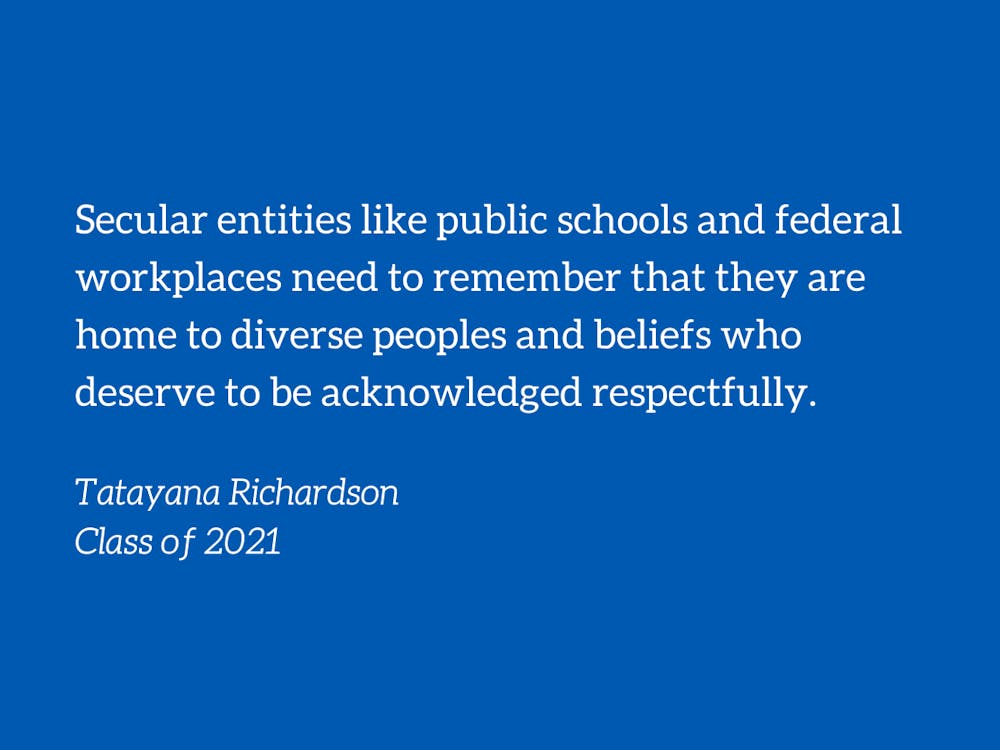Hello, and welcome back to my column.
As I began thinking about my column for this week, I was contending with that beginning of the semester drag. The one that comes after drop–add, with the realization that it’s spring semester during COVID and that we won’t really have any breaks until the end of the semester. And although administration threw in two mental-wellness days for a little razzle dazzle, there sets in the realization that there won't be much time for rest or recovery over the semester.
This led me to be slightly envious of the state schools, who often get the federal holidays off; however, since we are a private University, the holiday we get for the Semester is MLK Day. This train of thought led me down an interesting spiral of looking at a list of major holidays, both federal and religious. I was once again reminded of just how many non-Christian holidays there are in a year that we not only do not grant time off for, but whose existence and importance we fail to recognize at all.
If you happen to be like me, you may have attended a middle and high school with a large population of students who identified as Jewish and noticed that throughout the year on holidays such as Rosh Hashanah or Yom Kippur, many of those Jewish students were not at school. Rather, they would “take the day” off in order to observe the religious holiday. While it was an excused absence, school still went on without them, without so much as a mention of the holiday at all. This creates an unfair situation for students and their families, where they are forced to choose between their religion and their education. While I grew up seeing this as it applied to my school’s Jewish community, this construct is also common for holidays such as Diwali, a Hindu, Jain and Sikh holiday, and Eid al-Fitr in the Muslim tradition.
In contrast, school districts have often recognized and given more time off for Good Friday than has even been given for civic/federal holidays. Along with that, many businesses will begin celebrating Christmas in November, by putting up holiday decorations or even playing Christmas music throughout the building. Stores and TV channels such as Hallmark or Freefrom will market the entire month of December, and sometimes even the end of November, toward Christmas and Christmas centered production. While this is not necessarily overtly offensive, it shows how just how much space Christianity is able to take up on our yearly calendar, and how little acknowledgement or celebration there is for holidays that fall outside of this “norm.”
As if the erasure or ignorance of non-Christian holidays were not enough, the American people have also made a habit of turning important non-Christian holidays into capital ventures. And while there could be debate about how Christmas has also become a cash grab, chances are the people celebrating still have an idea of the origins of the holiday. However, the use of holidays such as Holi – the Hindu festival, sometimes also called the festival of spring or the festival of colors – for fun runs or hipster concerts discards all reverence for the holiday, and the people who partake in these celebrations likely have no idea what they signify.
All of this once again proves that we, most especially in America, live in a Christian-dominated society that refuses to make space for other religious beliefs.
I am not saying here that the Church needs to celebrate religious holidays outside of its belief system. However, what the Christian Church and American people as a whole can do is create space. Secular entities like public schools and federal workplaces need to remember that they are home to diverse peoples and beliefs who deserve to be acknowledged respectfully, rather than simply defaulting to a Christian calendar. This respect could and should take several forms, such as accurate education around non-Christian faiths and their histories and holidays. The restructuring should also include the inclusion of Holidays such as Rosh Hashanah, Yom Kippur, Eid-al fitr and Diwali – and several others – into the calendar as federally recognized holidays.
Some people would call this drastic, or say that it interrupts the flow of the work and school calendar, yet without it this nation will continue to be Christian-centered and dominated. The writing in of other cultures and religious experiences not only helps to celebrate the diversity of this nation, but also demands that this country and those who live within offer the respect and acknowledgement to the diversity that exists here.
Tatayana Richardson is a Trinity senior who thinks everyone should read the book "Empty Bottles Full of Stories." Her column, "searching for Canaan," runs on alternate Mondays.
Get The Chronicle straight to your inbox
Signup for our weekly newsletter. Cancel at any time.

